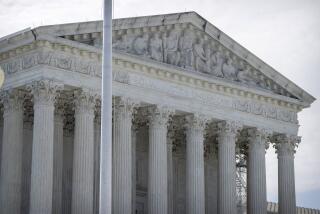Texas abortion limits law upheld by appeals court
- Share via
A new Texas law that’s been cited in the closures of more than a dozen abortion clinics in the state does not violate the U.S. Constitution, a federal appeals court ruled Thursday.
The U.S. 5th Circuit Court of Appeals’ decision overturns the ruling of U.S. District Judge Lee Yeakel, who last October held the abortion law unconstitutional because it made it too difficult for women to access abortion providers and served no medical purpose.
House Bill 2, passed by the GOP-controlled Texas Legislature last year, limits when, how and from whom women can obtain abortions. Among the new restrictions are limits on the types of medication that can be used to induce abortions and changes blocking abortions after five months of pregnancy.
DOCUMENT: Read the appeals court ruling
One of the changes requires physicians to have admitting privileges at a hospital within 30 miles of the clinic. Meeting that criteria has proved difficult for the rural clinics that were forced to closed.
“As this case currently stands, H.B. 2 on its face does not impose an undue burden on the life and health of a woman, and the district court erred in finding to the contrary,” the appeals court said in its ruling. The court had previously allowed the law to be enforced during the appeals process.
Planned Parenthood, which is among the plaintiffs in the case, is likely to appeal the case to the U.S. Supreme Court. The group’s national president, Cecile Richards, called Thursday’s ruling “terrible.”
“The latest restrictions in Texas will force women to have abortions later in pregnancy, if they are able to get to a doctor at all,” Richards said in a statement.
The appeals panel criticized Yeakel for improperly applying legal tests to the law. In one section, the court said Yeakel overstepped his bounds by second-guessing the Legislature’s fact-finding.
Since a U.S. Supreme Court decision in 1992, courts have been asked to strike down abortion laws whose purpose is to present a serious obstacle to abortion-seeking women.
The appeals court acknowledged that some women in rural parts of Texas might have to travel farther to get abortions as a result of the law. But the court found that most women in Texas were not affected and for those who were, the extra burden wasn’t substantial. They cited evidence from Planned Parenthood, which has been fighting the law, that showed more than 90% of women in Texas would still be able to find an abortion provider within 100 miles of home.
The lower court had found otherwise. Those findings were “vague and imprecise,” the appeals court in New Orleans said.
[Updated, 5:06 p.m. March 27: State officials and a self-described pro-life organization welcomed the decision.
“This unanimous decision is a vindication of the careful deliberation by the Texas Legislature to craft a law to protect the health and safety of Texas women,” Texas Atty. Gen. Greg Abbott said in a statement.
Jonathan Saenz, president of Texas Values, said in a statement said the ruling “affirms the will of the Texas people and will ensure that women’s health and the lives of the unborn are both given the highest protection.”]
Another portion of the law takes effect in September. It would require all abortions to take place in surgical facilities.
The appeals court did strike down one provision of the law, saying that the requirement of hospital ties can’t be enforced against doctors who had applied to – but not yet heard back – from a hospital.
Follow LATimes National on Facebook
ALSO:
Washington’s Hazel Slide was a long-known risk
Official mudslide death toll expected to ‘go up dramatically’
Boston mourns 2 firefighters killed in 9-alarm brownstone blaze
More to Read
Sign up for Essential California
The most important California stories and recommendations in your inbox every morning.
You may occasionally receive promotional content from the Los Angeles Times.











